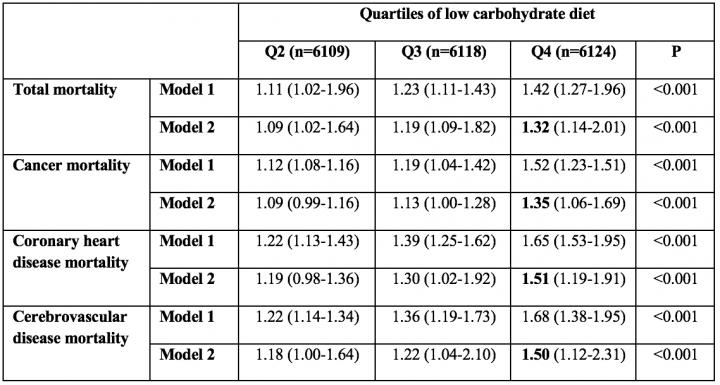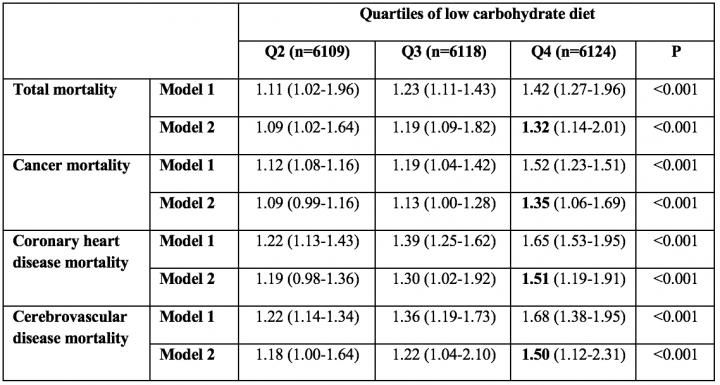
Credit: European Society of Cardiology
Munich, Germany – Aug. 28, 2018: Low carbohydrate diets are unsafe and should be avoided, according to a large study presented today at ESC Congress 2018.1
Study author Professor Maciej Banach, of the Medical University of Lodz, Poland, said: "We found that people who consumed a low carbohydrate diet were at greater risk of premature death. Risks were also increased for individual causes of death including coronary heart disease, stroke, and cancer. These diets should be avoided."
Obesity is a major health issue worldwide and raises the risk of several chronic conditions, including cardiovascular disease, hypertension, type 2 diabetes, and cancer. Different diets have been suggested for weight loss, such as diets low in carbohydrates and high in protein and fat. The long-term safety of these diets is controversial, with previous studies reporting conflicting results of their influence on the risk of cardiovascular disease, cancer, and death.
This study prospectively examined the relationship between low carbohydrate diets, all-cause death, and deaths from coronary heart disease, cerebrovascular disease (including stroke), and cancer in a nationally representative sample of 24,825 participants of the US National Health and Nutrition Examination Survey (NHANES) during 1999 to 2010. Compared to participants with the highest carbohydrate consumption, those with the lowest intake had a 32% higher risk of all-cause death over an average 6.4-year follow-up. In addition, risks of death from coronary heart disease, cerebrovascular disease, and cancer were increased by 51%, 50%, and 35%, respectively.
The results were confirmed in a meta-analysis of seven prospective cohort studies with 447,506 participants and an average follow-up 15.6 years, which found 15%, 13%, and 8% increased risks in total, cardiovascular, and cancer mortality with low (compared to high) carbohydrate diets (see figure for total mortality).
Professor Banach said: "Low carbohydrate diets might be useful in the short term to lose weight, lower blood pressure, and improve blood glucose control, but our study suggests that in the long-term they are linked with an increased risk of death from any cause, and deaths due to cardiovascular disease, cerebrovascular disease, and cancer."
Participants in the NHANES study had an average age of 47.6 years, and 51% were women. They were divided into quartiles based on the usual percentage of carbohydrates in their diet. The risks of all-cause and cause-specific death over an average 6.4-year follow-up rose with each fall in carbohydrate intake (see table), and remained significant after adjusting for all available factors that might have influenced the association (model 2 in the table).
The researchers also examined the link between all-cause death and low carbohydrate diets for obese (body mass index [BMI] 30 kg/m2 or greater) and non-obese (BMI under 30 kg/m2) participants in two age groups (55 years and older versus under 55) and found that the link was strongest in the non-obese older participants.
Regarding the mechanisms underlying the correlation between low carbohydrate diets and death, Professor Banach noted that animal protein, and specifically red and processed meat, has already been linked with an increased risk of cancer. He said: "The reduced intake of fibre and fruits and increased intake of animal protein, cholesterol, and saturated fat with these diets may play a role. Differences in minerals, vitamins and phytochemicals might also be involved."
He concluded: "Our study highlights an unfavourable association between low carbohydrate diets and total and cause-specific death, based on individual data and pooled results of previous studies. The findings suggest that low carbohydrate diets are unsafe and should not be recommended."
###
Figure: Forest plot of low carbohydrate diets and risk of total mortality
(CI = confidence interval)
Table: Multivariable-adjusted hazard ratios (95% confidence intervals) for mortality across quartiles of carbohydrate intake where Q4 is the lowest intake (Model 1: adjusted for age, sex, race, education, marital status, poverty to income ratio, total energy intake, physical activity, smoking and alcohol consumption; Model 2: adjusted for age, sex, education, marital status, poverty to income ratio, total energy intake, physical activity, smoking, alcohol consumption, body mass index, hypertension, serum total cholesterol and diabetes. Q1: considered as reference).
Media Contact
esc press office
[email protected]
@escardio
http://www.escardio.org





